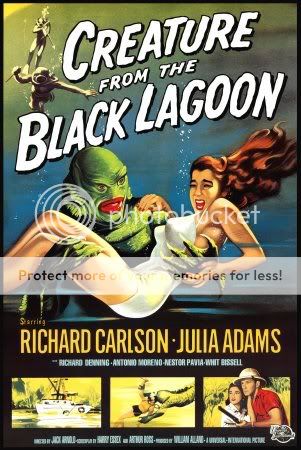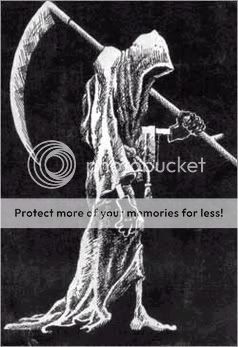Which is better? How do they differ? In what way do they reflect our time, society, us?
Every era has its monsters but some are more frightening than others and some are so deadly as to go beyond frightening.
I think really that monsters have become more frightening. I also think there's a very good reason for this: our world became a hell of a lot more frightening and in turn their depiction changed.
I love to consider all the monsters we've come to know and love: Frankenstein, Dracula, the Mummy, Zombies, werewolves and monster spinoffs from those monsters!
Don't forget about The Creature from the Black Lagoon, The Thing, Godzilla, Michael Myers, Pinhead and Freddy Kruger.
Monsters all, but do they differ? Do they reflect more what we fear in each era?
Frankenstein (actually the doctor's name) sought to address society's fear of science, where science could eventually take us. Both in the novel and in the film we see the nightmare brought about by a crazed scientist and his obsession to create life from dead tissue.
Dracula, at least the novel I feel was intended to discuss the obsession the Victorians had with female sexuality. Women hadn't been portrayed as wanton sexual creatures in fiction before Dracula. Now they were and everyone took notice.
The Mummy told the story of forbidden love and unimaginable punishment: torture and death for a taboo being broken. Poor old Mummy!
Zombies--and a bit of a morality play there. Zombies as portrayed in the 1940 films were I think more accurate as to what they were intended to be. They were slaves: mindless, obliging work-a-holics who were controlled by a lunatic sugar cane grower for instance.
It was sad, we felt sorry for them. But then they evolved into something else, horrifying cannibalistic decomposing monsters: the stuff of nightmares surely.
Werewolf films had a certain style about them in the 1940's. They were more romanticized than those sorts of films of today. Lon Chaney, Jr. defined Larry Talbot. His morphing into a werewolf after an attack is heart breaking. Later werewolf films were less romanticized and tended to be more frightening or at least more graphic. I think however the recent remake did capture that tragic romanticsm of the original nicely.
By the 1950's the monsters became more sci fi--that poor Creature from The Black Lagoon portrayed our fear of the unknown, and since it existed undiscovered until it kills, it was that much more terrifying because it was on earth with us only we didn't realize. That's horror at its best. The fear that something murderous exists hidden away.
I can recall swimming toward rafts in lakes as a child. Cutting through the dark water as fast as I could because who knew what horrible monsters were down in the murky depts, just waiting, ready to reach up and pull me down?! Boy did I try to get to the raft as fast as I could!
Then there was The Thing, an earlier film. This film took us into the thrilling realm of science fiction completely. Here was an alien monster--something unknown to us, something deadly and it was terrifying! The terrifying unknown again--stimulating our imaginations and scaring the daylights out of us.
It followed five years after the World War. The world was different after the war. Who knew what horrors could befall mankind after a war like that? We were in the atomic age. One fear led to another and U.F.O.'s and the horror of alien invasions took hold--hence pictures like The Thing.
Godzilla is another kind of Frankenstein. It comes about as a result of nuclear detonation. WE created it: mankind--our scientists brought forth this thing and share collective responsibilty for this scary beast. No nuclear stuff, no Godzilla, what a lesson, only we can't go back, Godzilla and all the nuclear stuff is here to stay!
Michael Myers (Halloween) is a real monster, a veritable killing machine who starts out as completely human but then evolves into something very different for the sequels. But his being human is what is far more terrifying. We've seen and read about killers like Myers. They are far too real and far too numerous.
Soon we get Alien a fantastically interesting film because, although a sci fi film ostensibly, it is also a horror film. I love that combination. If you think about it the alien monster and the crew could easily be transposed to a haunted house: the terrorized space crew can easily be switched to people battling demonic monsters.
Freddy Kruger (Nightmare on Elm Street) is another real monster: a child killer. That's his start and it's a brilliant concept. But then the supernatural element kicks in and he is so the stuff of nightmares!
Pinhead, created by the brilliant Clive Barker for the Hellraiser series is a human-like alien. There again that cool combo of horror and sci fi blended perfectly.
Pinhead first appears in Clive Barker's novella The Hellbound Heart (1986), in which he only appears in the story's beginning, and is portrayed as a sexually ambiguous follower of the "Engineer":
An excerpt:
'Its voice, unlike that of its companion, was light and breathy-the voice of an excited girl. Every inch of its head had been tattooed with an intricate grid, and at every intersection of horizontal and vertical axes a jeweled pin driven through to the bone. Its tongue was similarly decorated.'
—The Hellbound Heart, Clive Barker, ch. 1
I don't know about you, but I think Pinhead does it for me. I find him the most frightening of all the monsters.
Okay so we considered all this. Now for my conclusion. I feel the best thing that can happen to the horror genre in general is to keep new monsters coming: different monsters, highly original and each terrifying in its own, unique way.
Monsters make horror what it is and writers and filmakers create those monsters. And it's good because it's what horror fans want!
We want to be scared!








